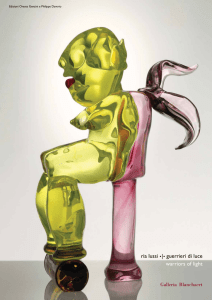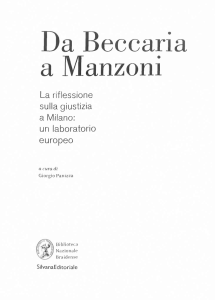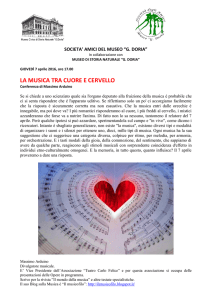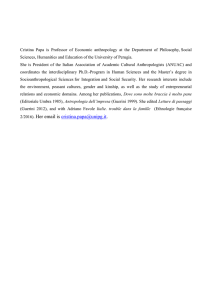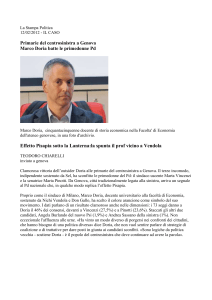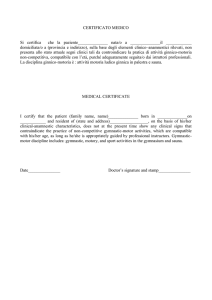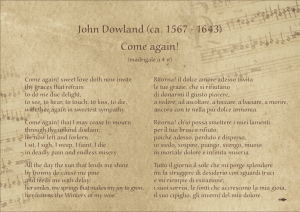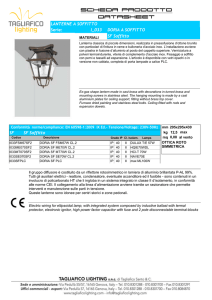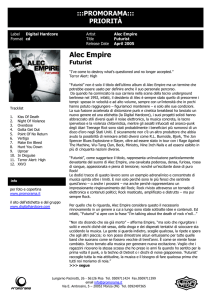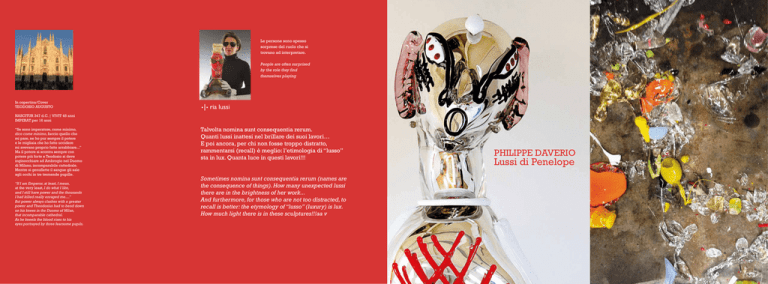
Le persone sono spesso
sorprese del ruolo che si
trovano ad interpretare.
People are often surprised
by the role they find
themselves playing
In copertina/Cover
TEODOSIO AUGUSTO
NASCITUR 347 d.C. | VIVIT 48 anni
IMPERAT per 16 anni
“Se sono imperatore, come minimo,
dico come minimo, faccio quello che
mi pare, ne ho pur sempre il potere
e le migliaia che ho fatto uccidere
mi avevano proprio fatto arrabbiare...”
Ma il potere si scontra sempre con
potere più forte e Teodosio si deve
inginocchiare ad Ambrogio nel Duomo
di Milano, incomparabile cattedrale.
Mentre si genuflette il sangue gli sale
agli occhi in tre tremende pupille.
“If I am Emperor, at least, I mean,
at the very least, I do what I like,
and I still have power and the thousands
I had killed really enraged me....”
But power always clashes with a greater
power and Theodosius had to bend down
on his knees in the Duomo of Milan,
that incomparable cathedral.
As he kneels the blood rises to his
eyes portrayed by three fearsome pupils.
Talvolta nomina sunt consequentia rerum.
Quanti lussi inattesi nel brillare dei suoi lavori…
E poi ancora, per chi non fosse troppo distratto,
rammentarsi (recall) è meglio: l’etimologia di “lusso”
sta in lux. Quanta luce in questi lavori!!!
Sometimes nomina sunt consequentia rerum (names are
the consequence of things). How many unexpected lussi
there are in the brightness of her work...
And furthermore, for those who are not too distracted, to
recall is better: the etymology of “lusso” (luxury) is lux.
How much light there is in these sculptures!!!aa v
PHILIPPE DAVERIO
Lussi di Penelope
Adam
3
Lussi di Penelope
glEYEss 01 | 2014
diametro 37 cm
di Philippe Daverio
Potrebbe sembrare che le lezioni di disegno le abbia
prese al contempo da Pablo Picasso e da Jacovitti, il gioco
del colore lo abbia imparato da un incrocio fra Fernand
Léger e Fortunato Depero. In realtà Ria Lussi fa da crogiolo
fra tutte le sperimentazioni del secolo che la precede per
inventare quello d’oggi, e se crogiolo deve essere quale
migliore se non quello dove il maestro vetraio scioglie
la sua preziosa materia in un calore indicibile nel quale
i colori non si vedono se non una volta l’opera finita e
raffreddata…
E poi vi è quella inclinazione magica che si chiama
“verve”, la capacità energetica del volere essere allegra,
il che è diventata con la nostra epoca recente una delle
prime eccellenze del mondo femminile che si libera nelle
arti e che ebbe come grande sacerdotessa la fenomenale
Niki de Saint Phalle, quella che trasformava i segmenti
della sua fantasia in pupazzi colorati e pieni di vita. Dagli
anni lontani della grotta paleolitica la mente femminile
è multitasking, capace di operare contemporaneamente
su diversi piani. Ria Lussi sembra volere comprovare la
complessità di questa apodittica affermazione. Dagli anni
del mito di Penelope, la donna mediterranea è esperta
d’una abilità manuale che impara dal il telaio il fulcro
della creatività suscettibile di trasformare il cosmo e il
tempo. Dagli anni di Merlino il Mago, lei è la fata Morgana
che illude i marinai con le visioni fantastiche di mondi
insospettati.
La storia epica degli imperatori romani si va quindi a
fondere con pupazzi ossessivi dell’infanzia, il sorriso da
etrusco si fa contemporaneo o forse eterno, l’occhio si
stupisce e sorprende. E la linea inizialmente sottile del
disegno si carica di colore, e poi ancora il colore si fa
materia, e infine la materia si fa forma. La forma danza un
suo ballo sottile di materia colorata. Ma il tutto sarebbe
solo esercizio se non fosse animato da una curiosa magia: i
personaggi non sono pupazzi. Come in un cartone animato
5
ancorato nella profonda e contorta innocenza d’un
infanzia talvolta bonaria talvolta crudele, queste creature
assumono una loro vita propria, diabolica o fiabesca, con
la dolce ferocia di far risuonare corde profonde celate nel
remoto delle anime. Ma tutto con apparente e morbida
leggerezza. E poi, ricordarsi (remember) è utile.
Gli artisti hanno un nome e un cognome. Talvolta nomina
sunt consequentia rerum. Quanti lussi inattesi nel brillare
dei suoi lavori… E poi ancora, per chi non fosse troppo
distratto, rammentarsi (recall) è meglio: l’etimologia di
“lusso” sta in lux. Quanta luce in questi lavori!!! Potete
leggere anche Real Lussi, la luce che si fa reale (real), e
nel caso degli imperatori regale (royal).
One might think that she took drawing lessons from Pablo
Picasso and Jacovitti at the same time, that she learned the
use of colour from a cross between Fernand Léger and
Fortunato Depero. But in reality Ria Lussi acts as a melting
pot of all the experimentation of the last century and
creates a contemporary one, and if melting pot it is then
what better one than one where the master glassmaker
melts his precious matter in unspeakable heat where
colours disappear and are only visible once the artwork
is complete and has cooled down…
And then there is that magical inclination that we call
“verve”, the dynamic ability to always want to be
cheerful, something that in recent times has become
one of the maximum expressions of female excellence
released in the arts and which saw the phenomenal Niki
de Saint Phalle as its high priestess, she who transformed
fragments of her imagination into lively colourful dolls.
Since the long past times of prehistoric caves, the
female brain is one that multitasks, or rather withholds
the ability to operate simultaneously on different levels.
Ria Lussi seems to want to demonstrate the complexity
of this indisputable affirmation. Since the days of the
myth of Penelope, the Mediterranean woman is skilled
with her hands, having learned from the loom where the
foundation of creativity liable to transform the universe
and time lies. Since the times of Merlin the Wizard, she is
the Morgan Le Fay who fooled sailors with illusory visions
of unsuspected worlds.
The epic history of the Roman Emperors thus blends
in with obsessive childhood dolls, the Etruscan smile
becomes contemporary or maybe eternal, the eye is
taken by surprise and surprises. And the initially fine
line of the drawing fills with colour, then colour turns into
matter and finally matter becomes form. The form dances
a subtle dance of coloured matter. But it would all be an
exercise in futility if it were not animated by a unique
magic: the characters are not dolls. Like an cartoon rooted
in the deep and twisted innocence of an at times wellmeaning and at others cruel childhood, these creatures
take on a life of their own, devilish or fantastic, with the
gentle ferocity of a deep chord embedded in the heart of
the soul. All, however with seemingly soft lightness.
Again, to remember is useful. Artists have a name and
surname. Sometimes nomina sunt consequentia rerum
(names are the consequence of things). How many
unexpected lussi there are in the brightness of her work…
And furthermore, for those who are not too distracted, to
recall is better: the etymology of “lusso” (luxury) is lux.
How much light there is in these sculptures!!!
One can also read as Real Lussi, light that becomes real,
or in the case of the Emperors, royal.
Sceptre
7
Augusto9
Grazie alla luce...
Thanks to light….
...Così nella creazione artistica l’anima è sollevata dal
mondo terreno ed entra nel mondo celeste: Lì senza immagini si nutre della contemplazione della sua esistenza,
tocca gli eterni noumeni delle cose e, impregnata, carica
di conoscenza ritorna nel mondo terreno. E tornando giù
per la stessa strada arriva alla frontiera della terrestrità,
dove il suo acquisto spirituale è investito in immagini simboliche le stesse che, fissandosi, formano l’opera d’arte...
Così nel campo della contemplazione sovrasensibile: il
mondo spirituale, invisibile non è in qualche luogo lontano, ma ci circonda; e noi siamo come sul fondo dell’oceano, siamo sommersi nell’oceano di luce. Eppure per la
scarsa abitudine, per l’immaturità dell’occhio spirituale,
non notiamo questo regno di luce, nemmeno ne sospettiamo la presenza, e soltanto con il cuore indistintamente
percepiamo il carattere generale delle correnti spirituali
che si muovono attorno a noi.
Pavel Florenskij
….Thus in artistic creation, the soul ascends from the earthly realm into the heavenly. There free of visual imagery,
the soul finds nourishment in the contemplation of its existence, embraces the eternal nouema of things, and, saturated, brimming with knowledge it returns to the earthly
realm. And descending along the same path it arrives at
the boundary between the two worlds and here the soul’s
spiritual learning is invested with symbolic imagery, that
very imagery that forms the work of art…..
Thus in the field of super sensible contemplation: the spiritual world, though invisible, is not in some far off place,
rather it surrounds us; and it is as if we were at the bottom
of the ocean, submerged by the ocean of light. And yet
through unfamiliarity, immaturity of the spiritual eye, we
fail to notice this realm of light and do not even suspect
its presence, and it is only with our hearts, indistinctly and
in general terms, that we perceive the spiritual currents
that move around us.
11
Quando disegno forse ho
il controllo del non controllo.
Il disegno è lineare.
Senza cancellature,
né ripensamenti.
Inserisco spesso qualche
elemento di disturbo.
When I draw maybe I am in
control of the lack of control.
A linear design. No erasures,
or second thoughts. I often
introduce some disruptive
elements.
13
Blank pages or white canvases are privi“Le pagine o le tele bianche sono gli
leged spaces where creative artists set
spazi privilegiati dove i creativi mettono
themselves a challenge and yet, at the
in gioco se stessi ma, al contempo, questi
same time, these spaces can turn into
spazi possono trasformarsi nelle insidiose
insidious quagmires where the disquiet
paludi in cui regna l’inquietudine delle
of unanswered questions holds sway. The
interrogazioni senza risposte. L’immaco-
immaculate brightness of a blank page
lato chiarore di un foglio può diventare
can become a dangerous battlefield
il pericoloso campo di battaglia dove si
where one experiences the angst of an
sperimenta il dolore dell’empasse, se la
impasse, if the sapient hand of the artist
mano sapiente dell’artista, come per in-
does not somehow magically choose
canto, non scegliesse i segni o le tessiture
the right brush strokes and chromatic
cromatiche in grado di tradurre intuizioni,
weaving with which to transpose feelings,
progetti, pensieri.
projects and thoughts.
Nel grado zero di un biancore dove
The white surface becomes a ring on whi-
tutto può accadere, la meraviglia del
gesto che traccia all’improvviso segni e
dispone colori, forse inattesi, scegliendo
tra infinite possibilità, provoca un brivido:
mostra l’inconoscibile mentre affiora per
manifestarsi. Ogni evento creativo è allo
stesso tempo interrogazione e responso,
viaggio e approdo, immersione e risalita,
trasalimento e certezza. Creare è l’atto
che permette ai nostri sogni, affascinanti
e misteriosi, di venire alla luce senza
l’arido vincolo delle decifrazioni
definitive.”
ch the artist fights the hardest of matches
to develop and transcribe inner visions
that, on the spur of a moment, transpire
from the materialistic layers of the everyday convention, as if they were revelations
stored away in dark corners. To be able to
convey past experiences that take shape
on a snow-white surface, like precious relics of the past to which new life is given,
is the extraordinary gift offered to those
that venture, with courage, on the impervious path of creation.
Umberto Palestini
15
La bellezza assoluta dei fiori mi incanta. Sto lì a guardarli,
impotente, invidiosa, come davanti all’incanto dell’intero
universo. Impermanenza... il neon come mezzo mi piace
perchè è al tempo stesso fragile e straordinariamente
longevo. Può essere sottoposto alle intemperie conservando la sua brillante, quasi inopportuna luminosità.
Al tempo stesso, come le cose più delicate, si può infrangere in un momento.
The absolute beauty of the flowers enchants me. Impermanence…neon is a medium that I adore because it is
fragile and enduring. It can be subjected to the worst
conditions and yet it maintains its shiny, almost inappropriate luminosity. At the same time, like the most delicate
of things, it can break in a flash.
Aspirare al migliorarsi, mi sembra del tutto umano. Così come il
nascondersi dietro innumerevoli
maschere. Ed ecco le ali ancora a
terra ma pronte a spiccare il volo,
verso l’alto. Ecco la foglia che
copre l’occhio, celando il volto,
ma solo in parte...
To aspire to better yourself
seems completely human to me
much in the same way that hiding
behind numerous masks is. And
here I am with my wings close to
my body, yet ready to take flight,
up and away. And here is the leaf
that covers my eye, hiding my
face, but only partially…
Who Am I? | 2013
75x105x10 cm
Tulipano | 2004 | 40x100x10 cm
Scrizia | 2004 | 35x68x10 cm
17
LE MATRICI CROMATICHE | Una cosmogonia emozionale
THE CHROMATICS MATRICES | An emotional cosmogony
Così come i maestri vetrai, quando riporto il Disegno sulla candida serica tela lavoro
a mano volante, bianco su bianco. Poi impugno il pennello giapponese...
Mi metto in sintonia, in ascolto. Procedo per visioni. Evito ogni forma di compiacimento
cromatico. La sensazione che provo al momento della Coloritura è quella di lanciarmi
da un alto trampolino in una piscina vuota. Ci vuole coraggio...
È una tecnica che richiede grande concentrazione, ma in compenso è fluida, veloce
e leggera...
Like the master glassmakers, I trace the Design on the candid silky canvas with floating
movement of my hands, white on white. Then I grab the Japanese brush…
I get in tune, in listening mode. I proceed following visions. I avoid any form of chromatic
complacency. When the time comes to add Colour, I feel as if I were about to throw
myself from a trampoline high up in the air down into an empty swimming pool.
You need courage. It is a technique that requires enormous concentration.
A sx: 100x200 cm | 2013
In alto 51x85 cm | 2010
19
“Il lavoro di Ria Lussi commuove per la ricerca paziente
della perfezione che esprime.
Le immagini che nascono da questa ricerca sono assieme
figurate e astratte, data la loro semplicità. Sembrano
uscite dal quaderno d’un bambino che paradossalmente,
però, dimostra di dominare il mestiere del disegno con
un segno deciso e fermo.
Nella sua opera non c’è più la preoccupazione d’innovare
la sensibilità del visitatore con corrucciate ed intellettuali
esperienze d’avanguardia, nella ricerca di qualche
rarefatto senso dell’esistenza. Piuttosto c’è la proposta
d’un godimento semplice e diretto, ragionevolmente
controllato, direi sereno, della fantasia”.
Massimiliano FLoridi
“The work of Ria Lussi is moving because of the patient
search for perfection that it expresses.
The images that derive from this research are both
symbolic and abstract, by virtue of their simplicity. They
seem to come from the sketch book of a child, who,
paradoxically, however, seems to dominate the craft of
drawing with a bold and poised trait.
In her work there is no longer the desire to create a
response in the visitor with an excruciating high-brow
avant-garde experience in search of some lofty sense to
human existence. More so, there is an simple and direct
invitation to enjoy, in a reasonably contained or rather
serene way, the realms of imagination”.
A sx: 80x80 cm
A dx: 40x40 cm
21
W.O.L.
I GUERRIERI DI LUCE
WARRIORS OF LIGHT
I caratteri che creo sembrano avere storie da raccontare e sembrano
trovarsi sulla Terra un po’ sprovveduti, un po’ disorientati.
The characters I create seem to have stories to tell and they seem to
be here on earth a little unwary, disoriented…
Orfeo | 2012
A sx: 80x120 cm
a dx: 30x24x8 cm
23
“Ria Lussi mischia tutto, la letteratura, la metempsicosi,
le sensazioni dell’ultimo minuto. La sua forza consiste in
un senso estetico sicuro, risultato di coraggio, ingenuità
e destino perché il senso estetico che non è né etico, né
anti-etico è però antitetico all’apprendimento.
O c’è o non c’è”.
Jean Blanchaert
“Ria Lussi mixes everything, literature, metampsychosis,
last minute sensations. Her power lies in her strong sense
of the aesthetic. a consequence of courage, ingenuity and
destiny, because the aesthetic sense, which is neither
ethical neither unethical,however is untithetical to learning.
Eithet you have it or you don’t have it”.
Silvia Blanchaert
A sx: Growing Up | 2012 | h. 64 cm
A dx: 5000 Years Old | 2012 | h. 48 cm
25
Con Roberto Maravacchio e Walter Ballarin
Maestro vetraio/Glass master
Danilo Zanella
Studio Berengo
Murano, 2012
In fornace, io sono come un padre in sala parto.
Silenziosi, i maestri vetrai mi lanciano sguardi fuggitivi,
poi guardano in rapida successione il mio disegno...
At the furnace while they are working,
I am like a father in the delivery room.
Taciturn, the glass masters throw evasive glances at me,
then they examine my design.
27
E.O.L.
IMPERATORI DI LUCE
EMPERORS OF LIGHT
Through twelve portraits, from Julius Caesar
to Constantine XI, the Series chronicles the
transformation of the Roman and the Byzantine
Empire, the latter “illuminated” as it was by the
Christian doctrine throughout its long history,
renewed its moral code over time.
Attraverso dodici ritratti, da Giulio Cesare a Costantino XI,
la Serie racconta la trasformazione dell’Impero Romano e
Bizantino che, “illuminato” dalla dottrina cristiana, rinnova
nel tempo il proprio codice morale.
29
Una Committenza Storica: La serie imperiale Doria Pamphilij
A legendary commission The Floridi Doria Pamphilj emperor series
Da mail di MF a RL del 22 aprile 2013
... Comunque la tua domanda più difficile a cui
rispondere rimane: Quale potrebbe essere la serie
di 12 Cesari oggi?
Da una parte, come leggerai nella relazione, la
tendenza storica degli ultimi secoli è stata quella
di inserire sempre più quelli post classici dai 12
di Svetonio ai 36 della Historia Augusta, dall’altra
criteri di scelta come quello filo-cristiano o morale
non avrebbero alcun senso oggi. Se fossimo al tempo dei poeti maledetti commissionerei certamente
i più trucidi e scandalosi: da Caligola a Nerone da
Diocleziano a Eliogabalo, Aureliano e Massenzio.
Secondo me non si prestano, però, ne alla mia committenza ne al tuo lavoro sul vetro!
Piuttosto avrei pensato ad una serie che comprenda
tutta la storia dell’Impero con un punto di vista globale non viziato dalla tradizione storica occidentale
assolutamente falsa che l’Impero sia finito con la
caduta di Roma! Cioè se dovessi farla per me oggi,
ci metterei dentro tutto l’Impero fino alle soglie della modernità perché la vera prospettiva di un uomo
contemporaneo sull’Impero dovrebbe essere quella
bizantina, cioè di un Impero arrivato clamorosamente alla modernità. È questa lunghissima storia
in fondo il dato più bello sul ruolo dell’imperatore.
Fatta così, la serie dei dodici suona molto diversa da
quella tradizionale, ma non insegue facili scandali
ed orrori della storia.
Potrebbe suonare così:
Giulio Cesare: il primo, l’uomo che si fa da solo. Il
coraggio, la prepotenza.
Augusto: il pacificatore, il politico capace di trovare l’equilibrio giusto. La pace, la corruzione.
Traiano: il conquistatore, quello che riesce a portare al massimo i confini. La forza, la violenza.
Marco Aurelio, il filosofo, capace di grandi sacrifici per il bene comune. L’intelligenza, l’astrazione.
Diocleziano, il risoluto, il politico che, vista la crisi,
forza le cose. La determinazione, l’ottusità.
Costantino, il pio, interpreta il presente alla luce
di verità superiori. La fede, la convenienza.
Teodosio, il teocrate, capace di utilizzare la
religione per unificare l’Impero. La religione, il
potere.
Romolo Augustolo, la vittima, il giovane di élite
che viene sacrificato dalla storia. Gioventù, morte.
Giustiniano, il grande, capace di imprese eroiche
ma anche miserabili. Ricchezza, povertà.
Leone I, il pratico, nelle difficoltà fu capace di
recuperare il possibile. Realtà, compromesso.
Irene, la bellissima, che pur di governare si trasformò in un ermafrodito. La bellezza, la finzione.
Costantino XI, il coraggioso, il giovane che scompare nell’ultima battaglia. L’eroe, la vittima.
La serie avrebbe bisogno poi anche di una certa
simmetria estetica, nota che i primi sono Imperatori
di tutto l’Impero, Costantino sposta il baricentro
ad Oriente fondando Costantinopoli e trasferendo
la capitale, gli ultimi sono fondamentalmente
Imperatori ormai d’Oriente. Forzando un po’
le cose, però, come spesso è utile in questi casi,
si potrebbe dire che la serie è formata da 4
Imperatori fondamentalmente di natura occidentale,
4 che vivono la separazione tra occidente e oriente
e 4 fondamentalmente ormai solo di natura
orientale. Questo potrebbe essere utile per
accorparli in tre serie che abbiano elementi estetici
distintivi comuni. Per esempio i 4 occidentali sono
i classici, i 4 dell’eta di mezzo i barbari sono i
selvatici, gli orientali gli ieratici. È solo uno schema,
perché in realtà Romolo Agustolo, per esempio,
fu imperatore formalmente solo d’occidente, per
esempio... Ma ti potrebbe essere utile ad una rappresentazione semplificata e didattica. Secondo me
le iconografie di questi Imperatori che puoi trovare
facilmente sulla rete, ti possono aiutare ancor più di
queste mie limitatissime nozioni storiche!
From the mail from MF April 22nd 2013
…Anyway, the most difficult of your questions to
answer is:
Which 12 Emperors would ideally form a contemporary series today?
On one hand, as you will read in the essay, in recent
centuries the tradition tended to include the post
classical Emperors , from Suetonius with his 12 up
to the 36 of Historia Augusta, and yet on the other
hand, a criteria of choice like pro-Christian or moral
based would not make sense today. If we were
living in the times of the cursed poets, I would most
certainly commission the most cruel and scandalous
Emperors: from Caligula to Nero, from Diocletian to
Elagabalus, Aurelian and Maxentius.
In my opinion they are not suitable for my commission or for your work with glass!
Instead I am thinking of a series that embraces the
history of the Empire from a global point of view,
one not spoilt by the completely false Western
historical tradition that inferred that the Empire
ended with the fall of Rome! In short if I were to choose a series for me today, I would include the entire
Empire up until the threshold of modern times, because the true perspective of contemporary man on
the Empire should be that of the Byzantine era, that
is an Empire that was astonishingly modern. And it’s
this really long history that is the most remarkable
aspect of the role of the emperor.
In this way the series of 12 would be very different
from the traditional series and it would not indulge
in the facile scandals and horrors of history.
It could be something like this:
Giulio Cesare, the first one, the self-made man.
Augustus, the peace-lover, the politician skilled in
finding the right balance.
Trajan, the conqueror, the one with the managed
to extend the borders of the Empire to the full.
Marcus Aurelius, the philosopher, prone to great
sacrifices for the common good.
Diocletian, the resolute, the politician, who forced
things in the face of the crisis.
Constantine, the devout, interpreter of the present
based on higher truths.
Theodosius, the theocrat, apt at using religion to
unify the Empire. Religion, as in power.
Romulus Augustulus, the victim of status who was
sacrificed by history.
Justinian I, the Great, capable of heroic enterprises, but also despicable ones.
Leo III the Isaurian, a pragmatist who managed to
salvage whatever possible in times of difficulty.
Irene of Athens, the beautiful, who became a hermaphrodite in order to rule.
Constantine XI Palaiologos, the bold youth who
disappeared during the last battle.
The series would also need to reflect a degree
of aesthetic symmetry, since the first group are
Emperors that ruled of the entire Empire, whereas
Constantine shifted the centre of gravity to the East,
founding Constantinople and transferring the seat
of the Roman Empire there and the last group were
by then basically Eastern Roman Emperors. Forcing
things a bit, though, as is often useful in these
situations, once could say that the series comprises
4 Emperors of the Western Roman Empire, 4 that
bridge the separation between the Western and the
Eastern Empire, and 4 that by that time were strictly
Eastern . This could be useful to aggregate them in
three series that share common distinctive aesthetic
traits. For example the 4 from the Western Empire
are classic Roman Emperors, while the 4 of the
middle era are barbarians, and those from the East
are hieratic. This is just an outline because actually
Romulus Augustulus, for example, was only officially
a Western Roman Emperor. But it could be useful
for you in view of presenting things in didactic and
simplified terms. In my opinion the iconography of
these Roman Emperors, that you can easily find on
the web, will be even more helpful that my rudimental historical knowledge.
31
I naturalmente classici | L’idea d’Impero
The naturally classic |The concept of Empire
(Colori tendenzialmente monocromi vegetali).
Giulio:
L’intuizione ferita
nell’orgoglio.
Augusto:
La dissimulazione
espressa con naturalezza.
(Colours tending on the monochrome, of vegetable origin).
Traiano:
La curiosità
di guardare oltre.
Marco Aurelio:
L’intelligenza consapevole
di se stessa.
Giulio:
Wounded pride,
the intuition.
Augusto:
Naturally expressed
dissimulation.
Traiano:
The curiosity
to look beyond.
Marco Aurelio:
Intellegence,
aware of itself.
I mutanti barbari | L’Impero diventa una realtà da gestire e mantenere
The barbarian transformers |The Empire becomes a context to manage and maintain.
(Colori intensi, artificiali, contrastanti).
(Intense colours, contrasting and artificial).
Costantino:
La gioiosità della
vittoria che tutto
include.
Diocleziano:
Il risultato di uno diviso
due è sempre diverso
dalla metà.
Teodosio:
L’iracondia genuflessa.
Romolo Augustolo:
La fanciullezza
in allerta.
Gli aureolati ieratici | L’Impero si spiritualizza fino a evaporare
Leone III:
Un’identificazione
difficile con l’immagine
del cielo.
Irene:
L’eterno dramma femminile di potere accedere al
potere solo sacrificando
i propri affetti.
Costantino:
The joyfulness
of victory is all
embracing.
Teodosio:
Kneeling wrath.
Romolo Augustolo:
Boyhood
with a wary eye.
The hieratic ones | The Empire becomes spiritual to the extent that it evapourates.
(Colori preziosi e delicati).
Giustiniano:
La raziocinante follia
come sistema.
Diocleziano:
The outcome of one
divided by two is always
different from a half.
(Precious and delicate colours).
Costantino XI:
L’Impero si spiritualizza
fino ad evaporare.
Giustiniano:
Rational folly
as a system.
Leone III:
An arduous
self-identification with
the image of heaven.
Irene:
Being able to acquire
power only at the price
of sacrificing one’s nearest
and dearest.
Costantino XI:
The Empire becomes
spiritual to the extent
that it evapourates.
33
Con Marco Signoretto
Con Walter Ballarin
Con Roberto Salzo
Maestro vetraio/Glass master
Silvano Signoretto
Studio Berengo
Murano, 2014
35
CESARE AUGUSTO
NASCITUR 63 a.C. | VIVIT 77 anni
IMPERAT per 45 anni
Augusto, prosecutore di Cesare,
ho percepito come grande dissimulatore.
Colui che, fluido come l’acqua,
si adatta ad ogni vaso e riesce
a fluire di situazione in situazione.
Come l’acqua, quasi invisibile.
Cristallo, trasparente, resistente.
Ma con quei due occhietti da anfibio un po’
affaticati…
Augustus, Caesar’s successor, I perceived
as complete dissembler. One who is as fluid
as the water that adapts to every shape of
vase and manages to flow from one
situation to another. Like transparent
water, almost invisible. Crystal, transparent,
resistant. But with two small amphibious
rather weary eyes.
CESARE TRAIANO
NASCITUR 53 d.C. | VIVIT 64 anni
IMPERAT per 19 anni
Il coraggio di percorrere l’Europa in tempi
in cui le genti dovevano sembrare provenire
da galassie diverse, la curiosità di guardare
oltre. Il color antracite con pagliuzze di
metallo a significare la resistenza, occhi
bene aperti sui lati e sul retro, a proteggersi
con prudenza. In bocca all’elmo, sul fronte,
una piccola sfera d’oro, una testimonianza
di luce, di ricerca di verità.
The courage to travel across Europe in
times when people seem to come from
different galaxies. The anthracite colour
with metal specks represents fortitude.
Eyes wide open on the sides and at the
back, as if to protect himself with caution.
And perched in the mouth of the helmet is
a small golden sphere. A testimony of light,
of seeking the truth.
CESARE MARCO AURELIO
NASCITUR 121 d.C. | VIVIT 59 anni
IMPERAT per19 anni
a cura di Gianluca Marziani
Forse per rifuggire dallo stereotipo
dell’imperatore filosofo e barbuto
l’ho visto da giovinetto, studioso
di greco, sicuramente già vecchio
nella sua immane saggezza.
I suoi riccioli, le vritti - in sanscrito
“onde pensiero” - diventano occhi,
orecchie e bocca a elica,
una capacità di sintesi senza uguali,
una grande consapevolezza.
To escape being stereotyped as the
bearded philosopher Emperor, I pictured
him as a young man, a Greek scholar.
Most certainly already old in his immense
wisdom. His curls, the vritti - in Sanskrit,
“thought waves” - spiral shaped eyes, sight;
and ears, hearing. An unrivalled capacity
for synthesis. A very great awareness.
CESARE DIOCLEZIANO
NASCITUR 240 d.C. | VIVIT 72 anni
IMPERAT per 21 anni
Si alza una mattina e guardandosi
intorno all’orizzonte non riesce a
vedere i confini del suo Impero,
si rende conto dell’impossibilità di
controllare un territorio così immenso
e la sua natura poco spirituale gli
impedisce di sognare. Così cede a un
ingannatore principio di realtà e divide,
creando un vuoto che la storia non
sarebbe più riuscita a colmare.
He gets up in the morning and looks at
the horizon around him and cannot see
the boundaries of the Empire. He realizes
how impossible it is to control such a huge
territory and his less than spiritual nature
prevents him from dreaming. So he yields
to a deceptive principle of reality and
divides, creating a void that History would
never again be able to fill.
CESARE COSTANTINO
NASCITUR 272 d.C. | VIVIT 63 anni
IMPERAT per 31 anni
Un essere solare. Il cielo, come una
corazza protegge il suo corpo e un
elmo naturale ricopre il suo volto.
un bottone che è un occhio, la cui
pupilla è una croce, assembla le parti,
le religioni, e una poco compiacente
barbetta gli protegge la gola.
“Your actions are your true intentions”
e così, senza pensarci troppo, sposta la
capitale un po’ più in là...
A sunny easy-going type. The sky like
armour protects his body and a natural
helmet covers his face. He has a button
for an eye, which, with a cross in the place
of the pupil, reunites the parts and the
religions and an unappealing scarce beard
protects his throat. “Your actions are your
true intentions” and just like that, without
thinking too much about it, he moves the
capital a little further away…
ROMOLO AUGUSTOLO
NASCITUR 461 d.C. | VIVIT 50 anni
IMPERAT per 2 anni
Gioca alla palla in un cortile quando
lo chiamano.
- Devi andare e fare l’imperatore
- Chi? Io?
In realtà aveva sentito delle voci che
l’avevano messo in allerta, ma come
i fanciulli fanno, aveva fatto finta di
niente, sperando così di evitare il
pericolo di ciò che si teme.
Ma per tranquillizzarlo gli mettono
ai lobi due importanti orecchini e al
mento una bella barbetta che lo faccia
sembrare più grande.
He was playing ball in the courtyard when
they called him.
- You have to become Emperor.
- Who? Me?
Actually he heard rumours that warned
him but as kids will he acted as if nothing
had happened hoping in this way to avoid
whatever he was afraid of. But to reassure
him they gave him two fancy earrings and
a handsome chin beard that makes him
look older.
GIUSTINIANO AUGUSTO
NASCITUR 482 d.C. | VIVIT 83 anni
IMPERAT per 38 anni
Quello che si sa di Giustiniano non lo
rende un tipo proprio simpatico, ma io
lo trovo amabile, sì, nella sua risolutezza.
Ho percepito in lui una ferrea
volontà di mettere ordine in tanta
inverosimile inadeguatezza.
Codificare le regole, stilare e far
condividere su rotoli di pergamena non
deve essere stato facile e gli è valsa la
stima dei posteri, quando l’avrebbe data
in cambio di un paio di occhiali.
What we know about Justinian
portrays him as an unlikable person,
but I appreciate him for his resolution.
I perceived in him the iron will to
create some kind of order amongst
so much inadequacy.
To codify rules, draft and share them on
scrolls of parchment, cannot have been
easy and earned him the respect of
posterity, which he would have exchanged
for a pair of glasses.
LEONE AUGUSTO
NASCITUR 675 d.C. | VIVIT 66 anni
IMPERAT per 24 anni
Quella delle icone è la questione
centrale, durante lo svolgimento
dell’Impero verso il suo compimento.
Ma personalmente avrei anche potuto
rinunciare a tutte le immagini del mondo,
fatta eccezione per la meravigliosa
sintesi visiva del manto celeste di Maria
e dell’aureola che così mi sono trovata ad
attribuire al devoto imperatore.
The question of the icons is central to
the progress of the Empire towards
its fulfilment, which in my opinion, was
ultimately its transformation into papacy.
But personally I could renounce all the
images in the world with the exception
of the excruciating visual synthesis
of the blue robe of Maria and the halo,
so I could not but attribute them to this
devout Emperor.
IRENE AUGUSTO
NASCITUR 752 d.C. | VIVIT 51 anni
IMPERAT per 5 anni
Irene, o l’umana resistenza alla rinuncia
di qualcosa a cui si crede di potere aspirare
per diritto e che ci si vede costantemente
negare a causa di un corpo di donna (in cui
non ci si vuole identificare).
Quello che ammiro in lei è la caparbia
insistenza del volere contro tutto e
contro tutti, quello che immagino è la sua
sofferenza nel dovere andare contro tutto e
contro tutti, affetti familiari compresi.
Irene, or rather, human resistance
personified, resistance to renouncing
something in which one believes one
can aspire to by right and that one is
constantly denied due the fact that one
has a woman’s body (with which one
does not identify). What I admire in Irene
is her steadfast persistence in pitting
against everything and everyone and what
I imagined she suffered in pitting against
everything and everyone, including her
nearest and dearest.
COSTANTINO XI AUGUSTO
NASCITUR 1405 d.C. | VIVIT 48 anni
IMPERAT per 4 anni
Salvare una città con i suoi abitanti,
salvare Bisanzio o salvare un’idea di se
stessi diversi dagli altri?
Cosa fa sì che un essere di fede di una
religione sia diverso da un essere di
fede di un’altra? Costantino è stato
bruciato dalla fede o dall’orgoglio
quando ha deciso di “rimanere nella
città assediata e senza speranza
ha condotto l’ultima battaglia?”
Ogni cosa ha un inizio, una durata e un
compimento, per poi trasformarsi in
qualche altra cosa che a sua volta ha
un inizio, una durata e un compimento,
per poi trasformarsi in qualche altra
cosa che a sua volta ha un inizio,
una durata e un compimento...
Saving a city and its inhabitants, saving
Byzantium or saving an idea of oneself
as different from everyone else?
What makes a person with faith of one
religion different from a person of faith of
another? Was Constantine burned by his
faith or by pride when he decided to stay
in the besieged and helpless city.
Did he fight the last battle? Everything has
a beginning, a duration and a completion,
before turning into something else, that
in turn, has a beginning, a duration and a
completion, before turning into something
that has a beginning, a duration and a
completion…
37
Genova, primavera/spring 2014
Nel giardino botanico di Villa del Principe, a Genova,
i dodici Imperatori, attorno alla monumentale fontana,
ruotano guardandosi intorno. Prendono il posto dei busti in
marmo lì originariamente collocati, nel 1589,
da Giovanni Andrea Doria, nipote del celebre condottiero.
In compagnia dei coniugi Floridi Doria Pamphilj
In the company of the Mr. and Mrs. Floridi Doria Pamphilj
In the botanical gardends of Villa Del Principe in Genoa, the twelve
Emperors are exhibited around the monumental fountain, rotating
and looking around themselves. They are located in place of the
marble busts that were positioned there in 1589
by Giovanni Andrea Doria, great-nephew of the famous condottiero.
39
A sx: Cesare
Traiano
Marco Aurelio
Leone III
41
Nel Chiostro di Palazzo Doria Pamphilj
i dodici Imperatori ruotano a seconda
dell’incidenza della luce che aziona
speciali basi rotanti a energia solare.
In the courtyard of the Palazzo Doria Pamphilj,
the twelve emperors spun around according to
the variations of light that triggered the special
solar energy rotating bases.
Roma,
autunno
fall 2014
43
Leone III
In compagnia dei coniugi Floridi Doria Pamphilj
In the company of the Mr. and Mrs. Floridi Doria Pamphilj
45
Cesare Giustiniano
in una foto ed elaborazione
di Enzo Ragazzini.
Augusto
47
“Ho incontrato Ria Lussi qualche anno fa a Tokyo, durante una fiera d’arte. Sono rimasto subito colpito dalla
sua complessa personalità: una donna elegante e raffinata ma anche semplice, un’artista carismatica e volitiva
ma anche riservata, quasi timida. La sua voce era pacata ed il suo linguaggio persuasivo, mi piacevano i suoi
discorsi e condividevo i suoi pensieri, espressi con intelligenza e con una cadenza quasi “mantrica”. Immediata compenetrazione con la materia e grande empatia col maestro vetraio sono state la chiave vincente,
ma Ria ha aggiunto anche determinazione, entusiasmo e gentilezza, caratteristiche che hanno letteralmente
conquistato il mio team e permesso la realizzazione del suo progetto “Imperatori di luce” ai massimi livelli
tecnici. Non senza la complicità attiva della materia, in quanto sono convinto che il Vetro di Murano sia “vivo”
ed abbia una sua sensibilità che determina, in qualche modo, la buona riuscita del risultato finale. E Luce e
Trasparenza sono proprio le caratteristiche peculiari del vetro, materiale scelto dall’artista per evidenziare
ed esaltare, nella sua globalità, i molteplici messaggi di questa installazione. Per quanto riguarda l’aspetto
puramente estetico, sono a dir poco entusiasta di come Ria sia riuscita, magistralmente, a far emergere la personalità di ciascuno dei 12 Imperatori in una scultura vitrea, in un busto. Ma è questa capacità che determina
il valore di un artista e, per quanto mi riguarda, sono gli artisti di questo livello che danno un senso alla mia
continua ricerca e al mio continuo “osare”, soprattutto nel mondo dell’arte Contemporanea. Ritornando agli
“Imperatori di luce”, mi sembra evidente la mia soddisfazione, perciò non aggiungo altro, se non una parola,
molto esemplificativa, dedicata in primo luogo a Ria Lussi e poi a tutti coloro che hanno collaborato alla realizzazione di questo progetto: Chapeau!”
Adriano Berengo
“I met Ria Lussi a few years ago in Tokyo during an art fair. I was immediately struck by the complex personality of Ria Lussi: a refined and elegant woman, yet also very natural. A charismatic artist, feisty and yet reserved,
almost shy. Her voice was soft and her way of speaking persuasive. I liked her conversation and shared her
opinions, expressed and with an almost “mantric” rhythm. Immediate and total grasp of the material and great
empathy with the master glass maker were the winning elements, but Ria added determination, enthusiasm
and kindness, qualities that won my team over and gave rise to the production “Emperors of Light” project at
the highest technical level possible. This was achieved with the active complicity of the material, since I am
convinced that Murano Glass is “alive” and has a sensitivity, that somehow determines the successful outcome
of a work. And Light and Transparency are the peculiar characteristics of glass, a medium chosen by the artist
to express and exalt, in its absoluteness, the very many messages that lie within this installation. From a purely
aesthetic standpoint, I am extremely enthusiastic about the “mastery” with which Ria has managed to bring
out the personality of each individual Emperor, in a glass sculpture, a bust.
But this is the ability that determines the value of an artist, and as far as I’m concerned, it is artists of this level that make my research and incessant “daring” worthwhile, especially in the world of Contemporary Art.
Going back to the “Emperors of Light”, the fact that I am pleased is evident, so I will not add anything further,
other than one very apt expression, dedicated in first place to Ria Lussi and to then to all those who collaborated on the realization of this project: Chapeau!”
Irene
49
Estate summer 2014
SPOLETO | Palazzo Collicola Arti Visive
“Ria Lussi agisce come una carezza sulla pelle candida:
il suo disegno si distende sul foglio con la morbidezza
eterea di un lampo ispirato; i suoi neon ricalcano nella
luce il gesto fluido della matita; le pitture su seta accolgono
l’aria limpida sul loro manto tatuato; le sculture in vetro
masticano mercurio e acqua limpida, con la conseguenza
di modulare la luce solare e artificiale, gestendo le
tonalità con la parsimonia sensibile del pittore”.
Gianluca Marziani
“Ria Lussi has the effect of a caress on white skin: her
drawing sprawls onto the sheet of paper with the ethereal
softness of a flash of inspiration; her works with neon
retrace the fluid motion of her pencil; her paintings on
silk welcome the terse air on their tattooed surfaces;
the glass sculptures chew mercury and clear water
and as a result balance both sunlight and artificial light,
managing different shades with the sensitive frugality
of the painter”.
51
Romolo Augustolo
53
Gianluca Marziani
Bruno Mari
Traiano
55
Matrix Mater Mother
a cura di Gianluca
Marziani
Matrix,-cis sta per fattrice, albero madre, ventre, causa, origine.
Matrix,-cis stands for, mare, mother tree, womb, cause, source.
La Matrix è l’hyphen, il trait d’union con la mia prima serie in vetro di Murano.
Il suo nome era “5000 years old”. In effetti nella mia concezione fantascientifica
della realtà tutto è un prequel di un sequel, cioè è il futuro a determinare il
presente, e non il passato. Non sai mai cosa aspettarti e l’arte è così al servizio
dell’umanità, a meravigliare…
The Matrix is the hyphen, the trait d’union with my first series of Murano glass
artworks. Her name was “5000 years old”. Infact in my fantastical conception
of reality everything is a prequel of a sequel, or rather it is the future that
determines the present and not the past. You never know what to expect and
art is therefore at the service of humankind, to hold us in awe and wonder….
SPOLETO | Palazzo Collicola Arti Visive
Matrix Imperatorum | 250x290x10 cm
Maestro vetraio Roberto Terenzi
Quest’opera progettata appositamente per il Museo,
accompagnava nell’installazione originale i Dodici Imperatori
di Luce della Serie Floridi Doria Pamphilij.
This artwork, designed especially for this Museum, was part of the
original installation of the Floridi Doria Pamphilij Contemporary Series
Twelve Emperors of Light.
57
Inverno winter 2014
MILANO | Villa Necchi Campiglio
FAI - Fondo Ambiente Italiano
“Arte del vetro oggi in Italia” a cura di Jean Blanchaert
59
Diocleziano
Costantino
Teodosio
Romolo Augustolo
Giustiniano
Irene
Costantino XI
61
Costantino
63
Biblioteca del Daverio
GRAZIE A... Thanks to...
Piazza Bertarelli, 4
Milano
Grazie a Philippe Daverio,
marzo 2015
Jean Blanchaert e Marco Teseo.
Grazie a Gianluca Marziani
presentazione
e Umberto Palestini.
Philippe Daverio
Grazie a Gesine e Massimiliano Floridi
testi in catalogo di
Doria Pamphilij e a tutto il team di
Adriano Berengo
Arti Doria Pamphilj.
Massimiliano Floridi
Gianluca Marziani
Grazie ad Adriano e Marco Berengo e a
Umberto Palestini
tutto il Berengo Studio team.
progetto grafico
Grazie a Roberta Mazzanti e Bruno Mari.
Veronica Vietri
Emanuele Rizzotti
Un grazie speciale a Silvano Signoretto,
Danilo Zanella e Roberto Terenzi,
foto
la cui maestrìa costituisce un
Damiano Daresta
indispensabile contributo a ogni mia sfida.
Virginio Favale
La loro abilità nel rendere i miei disegni,
Matteo Bianchi Fasani
come se fosse un gioco, e la loro sensibilità
Marcello Leotta
nel tradurre le espressioni emotive dei
Matteo Mazzali
singoli caratteri, è davvero senza pari.
Vincenzo Micarelli
Enzo Ragazzini
Many special thanks to Silvano Signoretto,
Lucia D’Angelo
Danilo Zanella and Roberto Terenzi, whose
mastery is essential for the outcome of
redazione
every challenge. Their ability to render
Francesca Cafaro
my drawings in glass - as if it were a game
Agata Azzellini
- and their sensitivity showed in translating
the emotional expressions of all the
traduzione
individual characters is unparalleled.
Nikki Taylor
Dulcis in fundo grazie a tutta la mia estesa
comunicazione
meravigliosa famiglia, Carlo Borriello
Art Attack Native Adv
e Alessandro Cucina!
rialussi.com
Le persone sono spesso
sorprese del ruolo che si
trovano ad interpretare.
People are often surprised
by the role they find
themselves playing
In copertina/Cover
TEODOSIO AUGUSTO
NASCITUR 347 d.C. | VIVIT 48 anni
IMPERAT per 16 anni
“Se sono imperatore, come minimo,
dico come minimo, faccio quello che
mi pare, ne ho pur sempre il potere
e le migliaia che ho fatto uccidere
mi avevano proprio fatto arrabbiare...”
Ma il potere si scontra sempre con
potere più forte e Teodosio si deve
inginocchiare ad Ambrogio nel Duomo
di Milano, incomparabile cattedrale.
Mentre si genuflette il sangue gli sale
agli occhi in tre tremende pupille.
“If I am Emperor, at least, I mean,
at the very least, I do what I like,
and I still have power and the thousands
I had killed really enraged me....”
But power always clashes with a greater
power and Theodosius had to bend down
on his knees in the Duomo of Milan,
that incomparable cathedral.
As he kneels the blood rises to his
eyes portrayed by three fearsome pupils.
Talvolta nomina sunt consequentia rerum.
Quanti lussi inattesi nel brillare dei suoi lavori…
E poi ancora, per chi non fosse troppo distratto,
rammentarsi (recall) è meglio: l’etimologia di “lusso”
sta in lux. Quanta luce in questi lavori!!!
Sometimes nomina sunt consequentia rerum (names are
the consequence of things). How many unexpected lussi
there are in the brightness of her work...
And furthermore, for those who are not too distracted, to
recall is better: the etymology of “lusso” (luxury) is lux.
How much light there is in these sculptures!!!aa v
PHILIPPE DAVERIO
Lussi di Penelope

